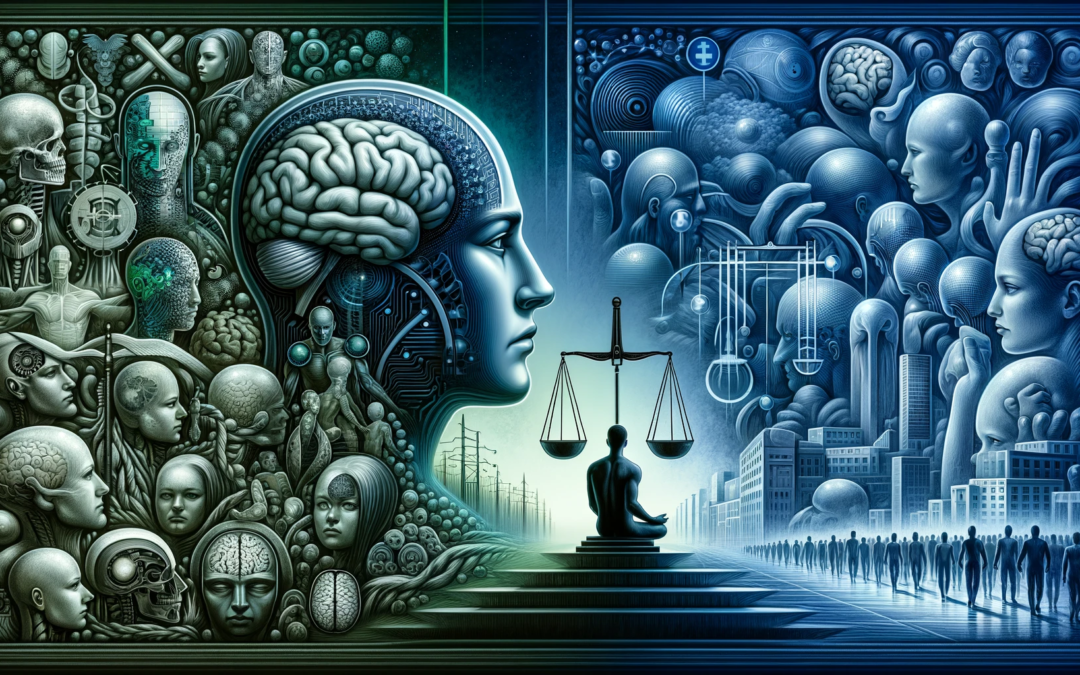Transhumanism, with its promise of enhancing human capabilities, raises profound ethical and social questions. In this second part of our series, we delve into the ethical debates surrounding transhumanist technologies and their broader implications for society.
Ethical Debates: Genetic Engineering and Human Enhancement
Let’s start by examining the ethical concerns related to genetic engineering. The idea of designer babies might sound like something out of a science fiction movie, but it’s a very real possibility. The ability to alter the genetic makeup of an unborn child raises moral implications about playing God and the risks of unforeseen long-term consequences. After all, who wants to end up with a child who has the ability to shoot lasers from their eyes but can’t tie their own shoelaces?
Brain Enhancement and Identity
Now, let’s dive into the ethical considerations of brain enhancement technologies. Neural implants and cognitive augmentations have the potential to significantly enhance human consciousness and cognitive abilities. But what does that mean for our sense of identity? Will we still be the same person if we can upload our minds into a computer or enhance our intelligence to superhuman levels? And more importantly, will we still be able to enjoy a good cup of coffee?
Impact on Society: Reshaping Social Structures
Transhumanist technologies have the potential to reshape social dynamics in ways we can’t even imagine. Imagine a world where people with enhancements have an unfair advantage over those without. We could end up with a new form of social stratification, where the enhanced elite rule over the unenhanced masses. It’s like the Hunger Games, but with better WiFi.
Changing Human Interaction
Enhanced communication technologies and augmented realities have the potential to redefine human interactions and social behavior. Just imagine a world where everyone is constantly connected to a virtual reality network. We might have to come up with new ways to express ourselves, like inventing a whole new set of emojis for when we’re feeling “enhanced.”
Accessibility and Equity: Inequality Concerns
One of the biggest concerns with transhumanist technologies is the risk of widening the gap between the haves and the have-nots. If only the wealthy can afford enhancements, we could end up with a society where the rich become superhuman and the poor are left behind, struggling to survive without the ability to grow an extra pair of arms to carry all their groceries.
Global Accessibility
And let’s not forget about the global implications. Making these technologies accessible and affordable globally, especially in developing countries, is a challenge. We don’t want a world where only a select few have access to the benefits of transhumanism. It’s like throwing a party and only inviting the cool kids.
Legal and Policy Considerations
As with any emerging technology, there are legal complexities to consider. We need to establish rights and protections for enhanced individuals. Imagine the lawsuits when someone accidentally uploads their consciousness into their neighbor’s toaster. We also need international laws and agreements to manage and regulate transhumanist technologies, because we don’t want a world where every country has their own set of rules for who gets to have laser eyes.
Ethical Governance
Ultimately, ethical governance is crucial in the development and implementation of transhumanist technologies. We need public policy that ensures these advancements are used responsibly and for the benefit of all. We don’t want a world where the only rule is “survival of the enhanced-est.”
Conclusion
In conclusion, transhumanism is a fascinating and potentially transformative field, but it comes with profound ethical and social implications. By exploring the ethical debates and societal impacts, we hope to contribute to the important dialogue on the responsible development and application of transhumanist advancements. So, let’s strap on our neural implants and embrace the future, but let’s not forget to ask ourselves, “Am I still human if I can shoot lasers from my eyes?”










